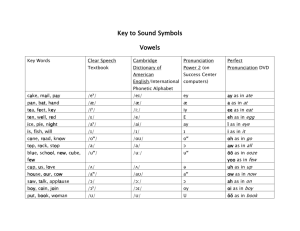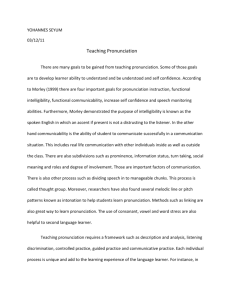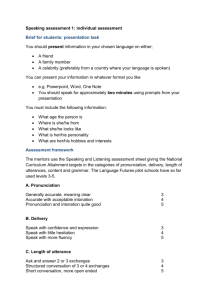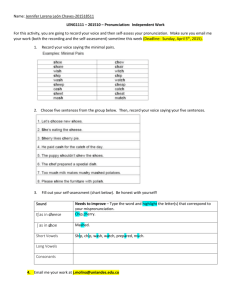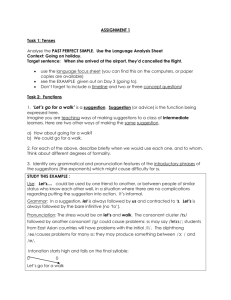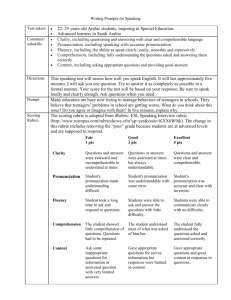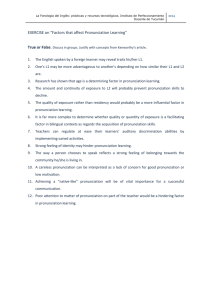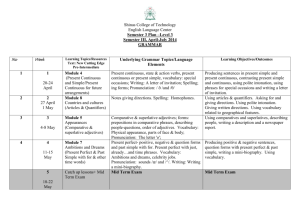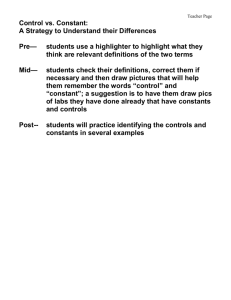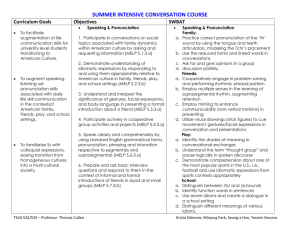Course Title : Oral Communication Skills II (ENGLB 1322)
advertisement
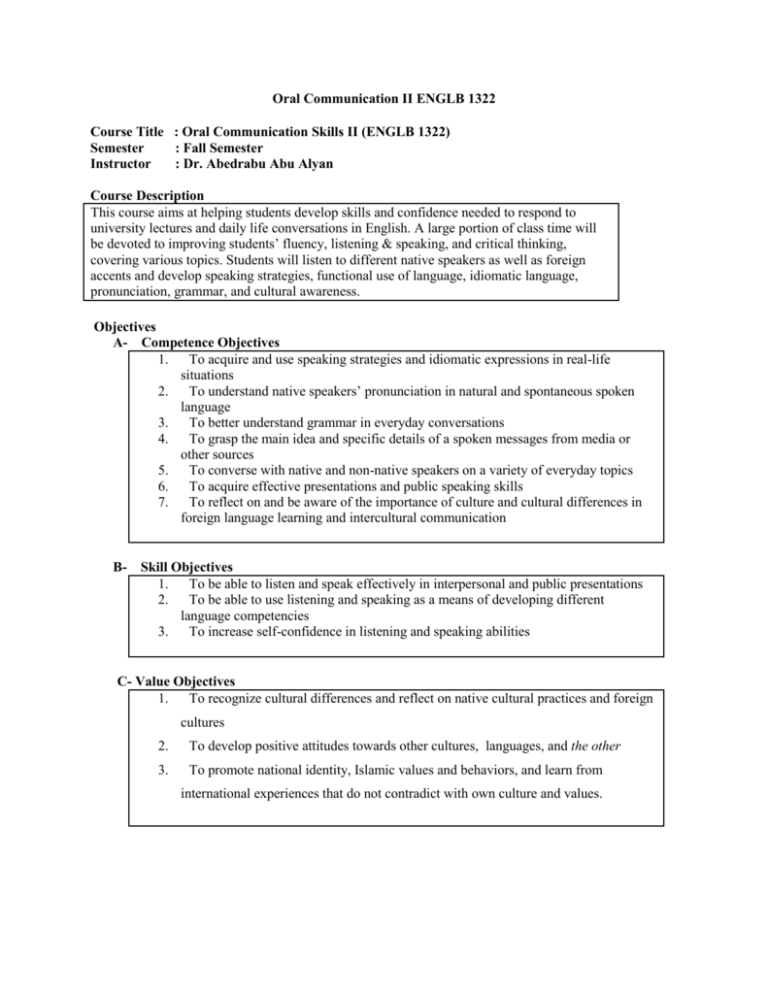
Oral Communication II ENGLB 1322 Course Title : Oral Communication Skills II (ENGLB 1322) Semester : Fall Semester Instructor : Dr. Abedrabu Abu Alyan Course Description This course aims at helping students develop skills and confidence needed to respond to university lectures and daily life conversations in English. A large portion of class time will be devoted to improving students’ fluency, listening & speaking, and critical thinking, covering various topics. Students will listen to different native speakers as well as foreign accents and develop speaking strategies, functional use of language, idiomatic language, pronunciation, grammar, and cultural awareness. Objectives A- Competence Objectives 1. To acquire and use speaking strategies and idiomatic expressions in real-life situations 2. To understand native speakers’ pronunciation in natural and spontaneous spoken language 3. To better understand grammar in everyday conversations 4. To grasp the main idea and specific details of a spoken messages from media or other sources 5. To converse with native and non-native speakers on a variety of everyday topics 6. To acquire effective presentations and public speaking skills 7. To reflect on and be aware of the importance of culture and cultural differences in foreign language learning and intercultural communication B- Skill Objectives 1. To be able to listen and speak effectively in interpersonal and public presentations 2. To be able to use listening and speaking as a means of developing different language competencies 3. To increase self-confidence in listening and speaking abilities C- Value Objectives 1. To recognize cultural differences and reflect on native cultural practices and foreign cultures 2. To develop positive attitudes towards other cultures, languages, and the other 3. To promote national identity, Islamic values and behaviors, and learn from international experiences that do not contradict with own culture and values. Intended Outcomes By the end of the course, students should be able to: 1. speak with confidence. 2. deliver and reflect on oral presentations: impromptu, informative and persuasive. 3. use appropriate language to discuss controversial issues 4. express ideas and opinions with evidence and precision 5. pronounce problematic words and expressions and use word and sentence stress (emphatic, corrective, etc) 6. reflect on their verbal and non-verbal communication skills 7. deliver and handle questions and answers in interviews 8. use a broad lexical repertoire. 9. use idiomatic expressions and collocated terms. 10. practice values such as cooperation in teams, tolerance of different opinions and etiquette of discussions. 11. to practice guessing, predicting, critical listening, inferencing, debating and persuasion, and analysis and interpretation Course contents distributed over 15 weeks for fall and spring semesters, and 7 weeks for Summer Week Week One Week Two Week Three Week For Week Five Week Six Subjects Course Introduction, socializing: begin and end a conversation in a natural way, react to what you hear, maintain a conversation and ask follow-up questions, express opinions and defend them Speaking strategy: agreeing Pronunciation: rising and falling intonation in tag question Eating out: understand explanation of dishes on a menu, offer to pay, complaint about common problems, understand restaurant reviews Speaking strategy: complaining in a restaurant Pronunciation: the schwa Living away from home: explain accommodation requirement, deal with problems and complaints effectively Speaking strategy: asking about alternatives, making your point more forcefully Shopping: understand a shop’s policy, ask questions about various products, bargain and reach an agreement Speaking strategy: making a complaint in a shop Pronunciation: intonation related to feelings or excitement and interest vs. feelings of boredom and lack of interest The media, describe and discuss films and TV programs, understand talk about the news, summarize stories, make predictions about what I will hear Speaking strategy: talking about films, summarizing Pronunciation: stress and rhythm Health: understand the doctor’s diagnosis and instructions Speaking strategy: Describing symptoms, showing concern and relief Pronunciation: linking /w/ and /j/ Week Seven Week Eight Week Nine Week Ten Week Eleven Week Twelve Week Thirteen Week Fourteen Week Fifteen Travel: understand detailed information about travel, ask for travel information, enquire about renting a car Speaking strategy: making recommendations, asking for detailed information Pronunciation: missing sounds-/t/, /d/, and /h/ Mid-term Exam Sightseeing: ask for recommendations before going on a trip, understand the details of a guided tour Speaking strategy: making polite requests, asking for recommendations, interrupting politely, asking for further details Requesting services: insist on what you want politely but firmly, bargain and negotiate. Speaking strategies: asking for services, making appointment, getting what you want, negotiating Pronunciation: stress for emphasis Money and mail: ask for a range of services at banks and post office, understand detailed explanations of different bank accounts, understand various ways of sending mail abroad, ask for clarification and explanation Speaking strategies: understanding details, confirming details, asking about terms you don’t understand Pronunciation: corrective stress Emergencies: report an incident to the emergency services, get straight to the point Messages: take complex phone messages, ask for clarification and check understanding, leave message and check other have understood, leave clear concise voicemail messages Speaking strategies: reporting crime, giving description, calling emergency services, reporting an emergency, giving a statement to the police Pronunciation: the schwa Meetings: participate actively in meetings, bringing others into discussion, make, accept and reject suggestions, clarify your view point and correct misunderstanding, bring a meaning to an end Lectures: understand the main ideas and the themes of a class, take concise notes, listen for signposts and style of delivery, summarize the main points of a talk Presentations and talks: give a short, simple presentation, structure a talk and use signposts, deal with questions Speaking strategies: taking a message, getting it right, making sure you have understood, note taking, leaving a message, leaving a voicemail Pronunciation: connected speech Seminars: understand how to give a well-organized seminar, , follow up a question, evaluate your performance. Speaking strategies: present an argument and reinforce key points Idiomatic expressions of American English Presentations! Assessment Attendance & Participation Moodle Mid-term Exam Project & Presentation Oral Exam Final Exam 10 % 10 % 20% 10 % 10 % 40 % Methods of Teaching To accomplish course objectives, I use an eclectic approach to suit the different students’ needs and learning strategies. Classes usually start with motivational openings to stimulate students’ interest in the topic. This may involve brainstorming, asking thought-provoking questions, tapping background, or stating the class objectives. Activities can also include problem-solving, creative thinking, and handout activities. Students are essentially engaged in all class activities and discussions. The activities encompass listening & speaking, pronunciation, and public speaking. Due to crowded classes, students can do exercises individually, in pairs, and in small groups. When students work in groups, the instructor will assign roles: leader, reporter, timekeeper, and participant. Finally, closing classes can be by wrapping up the main ideas of a class through teacher or students’ summary. Text book(s) 1. Craven, M. (2008). Real listening and speaking 3. Cambridge: Cambridge University Press. 2. Fragiadakis, H. (2007). All clear 3: listening and speaking with collocations. United States: Thomson Heinle. 3. Different audio and video materials from the Internet and other sources
